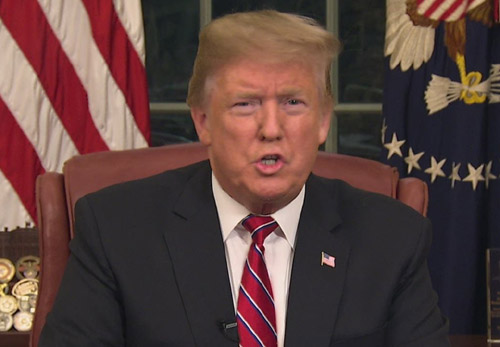by WorldTribune Staff, May 18, 2020
President Donald Trump is taking several steps in confronting China over its coronavirus negligence.
Trump has blocked trade with Chinese technology giant Huawei and has halted some U.S. retirement investments in China.

The Trump administration is also mulling how Beijing should compensate the world for infecting it with the virus.
White House trade adviser Peter Navarro said Saturday that there needs to be a broader discussion on “compensatory damages” from China for the way it handled the coronavirus outbreak.
“I think there needs to be a national discussion — has to be bipartisan — about compensatory damages by a country that inflicted this pandemic on the world,” Navarro said on Fox Business. “This crisis, and China’s role in virtually manufacturing this whole crisis, we need to have a national discussion.”
Trump said the virus “should have been stopped in China before it got out to the world — 186 countries are affected. Russia is now badly affected, France is badly affected. Look at Italy, look at Spain — all of these great countries, in many cases, have had to fight through this. It’s a terrible thing that happened. It should have been stopped right at the source, but it wasn’t.”
White House press secretary Kayleigh McEnany said Trump is “very frustrated with China.” She said China “slow-walked” information through the World Health Organization about human-to-human transmissions of the virus as well as information about its genetic sequencing, and allowed flights out of China while the virus was spreading.
“These decisions put American lives at risk, not just American lives, but lives around the globe,” she said.
Meanwhile, the Commerce Department moved Friday to block global chip supplies to blacklisted Huawei, The Washington Times reported. A new rule expands U.S. authority to require licenses for sale of semiconductors to Huawei, increasing Washington’s ability to halt exports to the world’s second-largest maker of smartphones.
Sen. Ben Sasse, Nebraska Republican and a member of the Senate Select Committee on Intelligence, said the rule was long overdue to prevent the “Chinese Communist Party’s tech puppet from obtaining U.S. semiconductor technology.”
“The United States needs to strangle Huawei,” Sasse said. “Modern wars are fought with semiconductors, and we were letting Huawei use our American designs. This is pretty simple: Chip companies that depend on American technology can’t jump into bed with the Chinese Communist Party.”
In response, Chinese propaganda outlet Global Times said Beijing was ready to put U.S. companies on an “unreliable entity list.”
China is lashing out at American lawmakers who are trying to hold it accountable in U.S. courts for spreading the coronavirus. According a Global Times report, Beijing is ready to “hit back” with its own sanctions.
The communist government is suggesting that China’s massive economy could halt investments in states represented by those who attempt to assign blame. At least four members of Congress “will be put on China’s sanctions list,” said the Global Times, citing “sources close to the matter.”
A number of lawmakers were named in the story, but those who drew particular attention from the Chinese press were Sen. Tom Cotton of Arkansas, Josh Hawley of Missouri, and Rep. Chris Smith of New Jersey, all Republicans.
“American Congresspeople who hold an anti-China stance like Smith have been long-term hawks on China-relevant topics such as Taiwan and Xinjiang. And Republicans like Hawley are also backed by some U.S. defense companies and other companies that compete with Chinese firms,” Diao Daming, a U.S. studies expert at the Renmin University of China in Beijing, told the Global Times.
Smith, who last year authored the Hong Kong Human Rights and Democracy Act, said he wouldn’t bow to pressure.
“Sanctions will not silence me or anyone who demands genuine accountability for this horrific pandemic,” he said in a statement over the weekend.
Hawley took to Twitter on Friday to call the sanctions threat a “badge of honor.”
Hawley is a former Missouri attorney general. His successor, Eric Schmitt, has filed a lawsuit arguing that the Chinese Communist Party directed the policies that have failed the world, allowing COVID-19 to spread and devastate the global economy.
In Missouri alone, Schmitt said in the lawsuit, “billions of dollars” have been lost to the coronavirus outbreak.
The Global Times said China will take steps to punish Missouri’s economy.
Last week, the White House pressured the board that runs the retirement savings program for federal employees and military personnel to halt, at least temporarily, a plan to invest funds in Chinese businesses.
The Federal Retirement Thrift Investment Board voted unanimously to pause its plan to shift billions of dollars in retirement assets to an index fund that includes about 8% Chinese companies, citing the COVID-19 pandemic and a new slate of board nominees from Trump.
Labor Secretary Eugene Scalia sent a letter to the Thrift Savings Plan’s governing board saying that “at the direction of President Trump, the board is to immediately halt all steps” toward switching to the broader international stock market index.
National Economic Council Director Larry Kudlow and national security adviser Robert C. O’Brien also urged the board to “cease implementation immediately.” They said the Chinese government hid crucial information about the virus from the U.S. and the rest of the world.
“These events dramatically increase the risk that Chinese companies could be subject to sanctions or boycotts that jeopardize their business and profitability and strongly militate against the Board making a significant investment of federal workers’ retirement funds in Chinese companies at this time,” Kudlow and O’Brien wrote.
Intelligence Brief __________ Replace The Media
